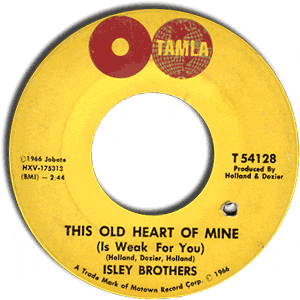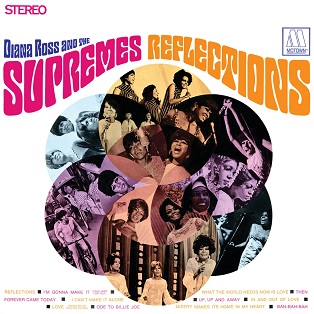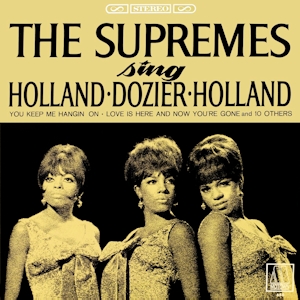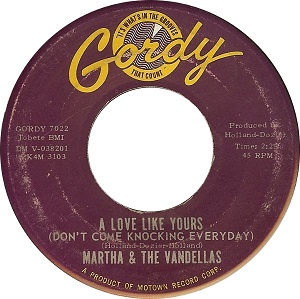
Martha and the Vandellas were an American vocal girl group formed in Detroit in 1957. The group achieved fame in the 1960s with Motown.

Lamont Herbert Dozier is an American singer, songwriter and record producer, born in Detroit, Michigan, United States. He has co-written and produced 14 US Billboard number 1 hits and 4 number ones in the UK.

"This Old Heart of Mine " is a Holland–Dozier–Holland song recorded by The Isley Brothers in 1965 that was a hit for them in January 1966 during their brief tenure on Motown's Tamla label. Featuring Ronald Isley on lead vocal, "This Old Heart of Mine" peaked at number twelve on the Billboard Hot 100, and at number six on the Billboard R&B Singles chart.

"Nowhere to Run" is a 1965 pop single by Martha and the Vandellas for the Gordy (Motown) label and is one of the group's signature songs. The song, written and produced by Motown's main production team of Holland–Dozier–Holland, depicts the story of a woman trapped in a bad relationship with a man she cannot help but love.

Reflections is the twelfth studio album recorded for Motown by Diana Ross & the Supremes. Released in 1968, it was the first regular studio LP to display the new billing of the group formerly known as "The Supremes." It contains the singles "Reflections", "In and Out of Love" and "Forever Came Today". Also included are covers of songs made famous by Martha and the Vandellas and The 5th Dimension. Also present are songs written by other famous names, including "Bah-Bah-Bah" co-written by Motown singer Brenda Holloway with her younger sister, Patrice, an original Smokey Robinson composition titled "Then", and "What the World Needs Now Is Love" by Burt Bacharach and Hal David, which Motown planned to release as a single in the spring of 1968, but cancelled. It also contains a cover of Bobbie Gentry's "Ode to Billie Joe," whose original recording kept the single #2 "Reflections" from peaking at the top spot on the Billboard Hot 100 in September 1967, and it hit #2 on Cashbox.

The Supremes Sing Holland–Dozier–Holland is the tenth studio album released by The Supremes for Motown in 1967. It includes the number-one hit singles "You Keep Me Hangin' On" and "Love Is Here and Now You're Gone". As the title states: all songs on the album were written and produced by Motown's main songwriting team of Holland–Dozier–Holland. Most of the album was recorded during the spring and summer of 1966; however several songs date back to the summer of 1964.

"Heat Wave" is a 1963 song written by the Holland–Dozier–Holland songwriting team. It was first made popular by the Motown vocal group Martha and the Vandellas. Released as a 45 rpm single on July 9, 1963, on the Motown subsidiary Gordy label, it hit number one on the Billboard Hot R&B chart—where it stayed for four weeks—and peaking at number 4 on the Billboard Hot 100.
"Quicksand" is a 1963 soul-dance single by Motown girl group Martha and the Vandellas.
"Live Wire" is a 1964 dance single released by Motown girl group Martha and the Vandellas.
"In My Lonely Room" is a 1964 single by Motown girl group Martha and the Vandellas. In this song, which registered at #6 R&B (Cashbox) and #44 Pop, the narrator solemnly discusses how her lover's flirting with other girls leave her so depressed that all she can do was sit by "(her) lonely room and cry". The song was produced under a more solemn though still uptempo gospel-influenced number that had been on a number of the group's hits starting with "(Love Is Like a) Heat Wave". It was their fifth hit with Holland–Dozier–Holland.
"I'm Ready for Love" is a 1966 single by Motown girl group Martha and the Vandellas. The song, produced and written by Holland–Dozier–Holland, and was written in a similar style to The Supremes' smash hit, "You Can't Hurry Love".

"Jimmy Mack" is a pop/soul song that in 1967 became a hit single by Martha and the Vandellas for Motown's Gordy imprint. Written and produced by Motown's main creative team, Holland–Dozier–Holland, "Jimmy Mack" was the final Top 10 pop hit for the Vandellas in the United States, peaking at number 10 on the Billboard Hot 100 in 1967 and at number-one on the Billboard R&B Singles chart. Billboard named the song #82 on their list of 100 Greatest Girl Group Songs of All Time.
"Love Bug Leave My Heart Alone" is a 1967 single released by Motown girl group Martha and the Vandellas. The song's production was a departure from the Vandellas' repertoire as their label, Motown, was having a harder time staying with the times in the music industry and having a much harder time finding a hit for its acts after several departures including Vandellas collaborators William "Mickey" Stevenson and Holland-Dozier-Holland, who produced the b-side to this single, "One Way Out", one of the trio's final recordings with the Vandellas. Produced by Richard Morris, the song displayed of the narrator wanting "the love bug" to leave her alone so she won't "fall in love". The narrator, lead singer Martha Reeves, was left heart-broken the last time she allowed the man to come back to her but after suffering heartbreak, she expresses her disgust at the man's attempts, with her fellow members Rosalind Ashford and Betty Kelley chanting "get outta there, love bug, leave my heart alone". The song was their second consecutive Top 40 single of 1967 peaking at number twenty-five on the Billboard pop singles chart and number fourteen on the Billboard Hot R&B singles chart. The record was the first track ever played on UK Radio One by DJ John Peel.
"Love " is a 1965 pop ballad by Motown girl group Martha and the Vandellas. A rare ballad for the group, whose forte was reportedly uptempo soul dance numbers including "Dancing in the Street" and "Nowhere to Run", the b-side to the group's single, "You've Been in Love Too Long", although the song only peaked at #70 on the Billboard Hot 100 singles chart and #22 on the Billboard Hot R&B singles chart, it was number one on many American urban radio playlists.The song, written and produced by Holland–Dozier–Holland, has the narrator explain why love makes her do things she later regrets. Cash Box described it as a "plaintive, slow-shufflin’ heart-throbber with a nostalgic years-back sound."

Heat Wave is the second studio album released by American Motown girl group Martha and the Vandellas. Released in 1963 on Motown's Gordy imprint, intended to capitalize on the success of the title track, which rose to number four on the pop singles chart and number one on the R&B singles chart. The album was produced by Holland–Dozier–Holland and William "Mickey" Stevenson. This was the last album to feature original Vandella Annette Beard.

Come and Get These Memories is the debut album by the American girl group Martha and the Vandellas, released in 1963. Put out by Gordy after the success of the trio's hit of the same name, the album also contains the group's debut single, "I'll Have to Let Him Go", which was originally intended for Mary Wells, and "A Love Like Yours ". Most of the album was produced by Holland–Dozier–Holland and William "Mickey" Stevenson.

"A Love Like Yours " is a 1963 song issued as the B-side to Motown singing group Martha and the Vandellas' hit single, "Heat Wave", released on the Gordy label.

"When the Lovelight Starts Shining Through His Eyes" is a song written by Holland–Dozier–Holland and recorded in 1963 by Motown singing group The Supremes. It is notable as the Supremes' first Billboard Hot 100 Top 40 recording, following seven previous singles between January 1961 and September 1963 which failed to enter the Top 40. The single is also notable as the first Supremes single written and produced by Holland–Dozier–Holland, who had previously created hits for Martha and the Vandellas and Mary Wells.
"Mickey's Monkey" is a 1963 song recorded by the R&B group The Miracles on Motown Records' Tamla label. It was written and produced by Motown's main songwriting team of Brian Holland, Lamont Dozier, and Eddie Holland, who later went on to write two more Miracles hit singles, the Top 40 "I Gotta Dance to Keep From Crying", and the Top 20 "(Come 'Round Here) I'm The One You Need". This was unusual, as most Miracles songs were composed by the group members themselves.
"Too Hurt to Cry, Too Much in Love to Say Goodbye" is a 1963 song and single written and composed by Motown's main production team Holland–Dozier–Holland. Credited to the Darnells, the performers on both sides of the single were in fact the Andantes, Holland–Dozier–Holland, Mary Wilson of the Supremes (B-side), and members of the Marvelettes, the Four Tops, and the Temptations. Nobody involved with the production on either side was pleased with the false credit. Whatever the reason it was done, it didn't work as the single only peaked at 17 on the Billboard Bubbling Under Hot 100 charts.











